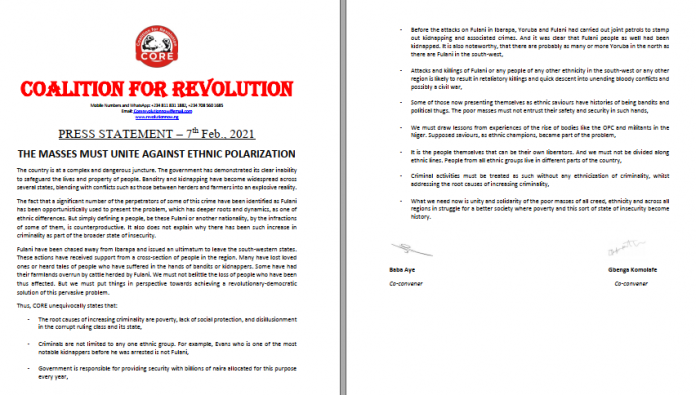The country is at a complex and dangerous juncture. The government has demonstrated its clear inability to safeguard the lives and property of people. Banditry and kidnapping have become widespread across several states, blending with conflicts such as those between herders and farmers into an explosive reality.
The fact that a significant number of the perpetrators of some of this crime have been identified as Fulani has been opportunistically used to present the problem, which has deeper roots and dynamics, as one of ethnic differences. But simply defining a people, be these Fulani or another nationality, by the infractions of some of them, is counterproductive. It also does not explain why there has been such increase in criminality as part of the broader state of insecurity.
Fulani have been chased away from Ibarapa and issued an ultimatum to leave the south-western states. These actions have received support from a cross-section of people in the region. Many have lost loved ones or heard tales of people who have suffered in the hands of bandits or kidnappers. Some have had their farmlands overrun by cattle herded by Fulani. We must not belittle the loss of people who have been thus affected. But we must put things in perspective towards achieving a revolutionary-democratic solution of this pervasive problem.
Thus, CORE unequivocally states that:
– The root causes of increasing criminality are poverty, lack of social protection, and disillusionment in the corrupt ruling class and its state,
– Criminals are not limited to any one ethnic group. For example, Evans who is one of the most notable kidnappers before he was arrested is not Fulani,
– Government is responsible for providing security with billions of naira allocated for this purpose every year,
– Before the attacks on Fulani in Ibarapa, Yoruba and Fulani had carried out joint patrols to stamp out kidnapping and associated crimes. And it was clear that Fulani people as well had been kidnapped. It is also noteworthy, that there are probably as many or more Yoruba in the north as there are Fulani in the south-west,
– Attacks and killings of Fulani or any people of any other ethnicity in the south-west or any other region is likely to result in retaliatory killings and quick descent into unending bloody conflicts and possibly a civil war,
– Some of those now presenting themselves as ethnic saviours have histories of being bandits and political thugs. The poor masses must not entrust their safety and security in such hands,
– We must draw lessons from experiences of the rise of bodies like the OPC and militants in the Niger. Supposed saviours, as ethnic champions, became part of the problem,
– It is the people themselves that can be their own liberators. And we must not be divided along ethnic lines. People from all ethnic groups live in different parts of the country,
– Criminal activities must be treated as such without any ethnicization of criminality, whilst addressing the root causes of increasing criminality,
– What we need now is unity and solidarity of the poor masses of all creed, ethnicity and across all regions in struggle for a better society where poverty and this sort of state of insecurity become history.
Baba AYE Gbenga KOMOLAFE
Co-convener Co-convener









